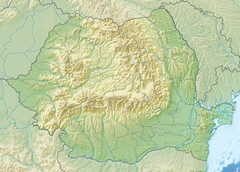
Constanța is a county (județ) of Romania on the border with Bulgaria, in the Dobruja region. Its capital city is also named Constanța.
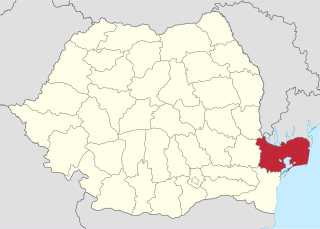
Tulcea County is a county (județ) of Romania, in the historical region Dobruja, with the capital city at Tulcea. It includes in its northeast corner the large and thinly-populated estuary of the Danube.

Teleorman County is a county (județ) of Romania on the border with Bulgaria, in the historical region Muntenia, with its capital city at Alexandria.

Cernavodă is a town in Constanța County, Northern Dobruja, Romania with a population of 20,514.

Măcin is a town in Tulcea County, in the Northern Dobruja region of Romania.
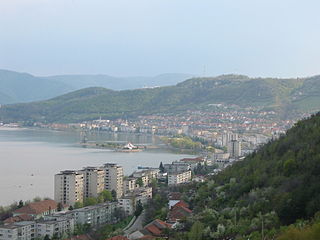
Orșova is a port city on the Danube river in southwestern Romania's Mehedinți County. It is one of four localities in the county located in the Banat historical region. It is situated just above the Iron Gates, on the spot where the Cerna River meets the Danube.

Trajan's Bridge, also called Bridge of Apollodorus over the Danube, was a Roman segmental arch bridge, the first bridge to be built over the lower Danube and one of the greatest achievements in Roman architecture. Though it was only functional for 165 years, it is often considered to be the longest arch bridge in both total and span length for more than 1,000 years.

Murfatlar is a town in Constanța County, Northern Dobruja, Romania. It officially became a town in 1989, as a result of the Romanian rural systematization program.
Timiș-Cerna Gap is a mountain pass in South-Western Romania, mostly in Caraș-Severin County, dividing the Southern Carpathians and the Banat mountain ranges, both part of the Carpathians.
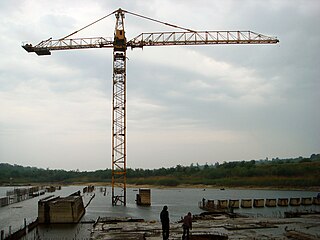
The Danube–Bucharest Canal is a 73-kilometre (45 mi) long canal project that is planned to link Bucharest, Romania to the Danube via the Argeș River, and ultimately create direct access to the Black Sea via the existing Danube–Black Sea Canal.

Trajan's Wall is the name used for several linear earthen fortifications (valla) found across Eastern Europe, in Moldova, Romania, and Ukraine. Contrary to the name and popular belief, the ramparts were not built by Romans during Trajan's reign, but during other imperial periods. Furthermore, the association with the Roman Emperor may be a recent scholarly invention, only entering the imagination of the locals with the national awakening of the 19th century. Medieval Moldavian documents referred to the earthworks as Troian, likely in reference to a mythological hero in the Romanian and Slavic folklore. The other major earthen fortification in Romania, Brazda lui Novac, is also named after a mythological hero.
Traian or Trajan can refer to:
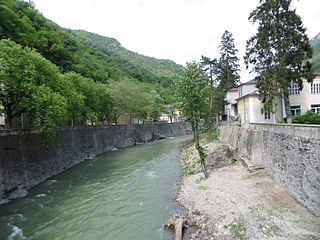
The Cerna is a river in Romania, a left tributary of the river Danube. The Cerna has its source on the south-east side of the Godeanu Mountains and flows into the Danube near the town Orșova. The upper reach of the river is sometimes called Cernișoara. With a length of 79 km (49 mi) and its basin of 1,380 km2 (530 sq mi), it carves an erosive tectonic valley with numerous gorges, quite deep sometimes. There is a man-made lake on it (Tierna), just before it crosses the Băile Herculane spa, to perpetuate the old toponimic od Dierna. The upper course of the Cerna is part of the Domogled-Valea Cernei National Park. The Cerna flows through the villages and towns Cerna-Sat, Țațu, Băile Herculane, Pecinișca, Bârza, Topleț, Coramnic and Orșova.
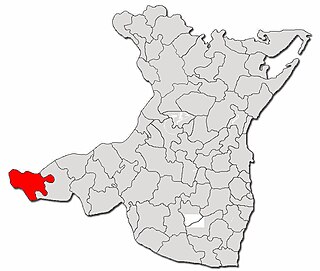
Ostrov is a commune in Constanța County, Northern Dobruja, Romania.

Cerna is a commune in Tulcea County, Northern Dobruja, Romania. It is composed of four villages: Cerna, General Praporgescu, Mircea Vodă and Traian. The commune is inhabited by a large number of Megleno-Romanians.
Nova Cherna is a village on the Danube, in northeastern Bulgaria, part of Tutrakan Municipality, Silistra Province. The current name is derived from the commune of Cerna in Northern Dobruja, whence its Bulgarian villagers were resettled and replaced by Megleno-Romanians according to the population exchange stipulated by the Treaty of Craiova in 1940. A nature reserve named Kalimok Brashlen is located near the village.
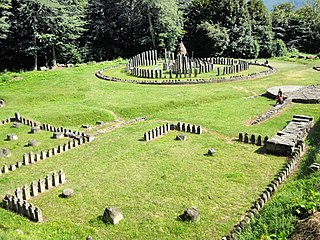
The Battle of Sarmizegetusa was a siege of Sarmizegetusa, the capital of Dacia, fought in 106 between the army of the Roman Emperor Trajan, and the Dacians led by King Decebalus.

The Western Romanian Carpathians, along with the Eastern Romanian Carpathians and the Southern Carpathians is one of the three main mountain ranges of Romania. Their name is given based on their geographical position, west, to the Transylvanian Plateau, which is simultaneously their eastern limits, respectively to the Timiș-Cerna Gap of the Banat Mountains, the southern group of the Western Carpathians.
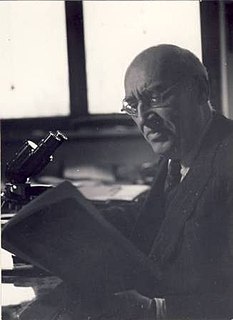
Traian Săvulescu was a Romanian biologist and botanist, founder of the Romanian School of Phytopathology, member and president of the Romanian Academy.
